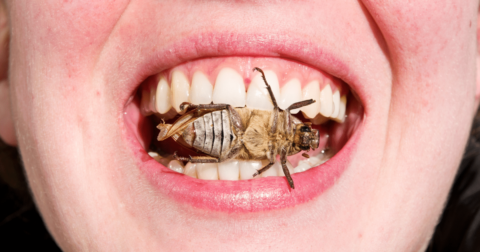Southwest Wisconsin Dairy Operation Linked to Spill Affecting Eight Miles of Trout Waters
Climate•4 min read
Explainer
The surprising origins of the idea that billionaire Bill Gates wants to feed you insects.


Words by Jessica Scott-Reid
If you are someone like me — interested in issues like climate change, food systems and alternatives proteins — and you engage with these topics online, you may find yourself inundated with comments and replies about billionaire Bill Gates. I’m told, often, that Gates has a particular agenda when it comes to food.
“Bill Gates wants to get rid of the cattle industry, and have people eat his FAKE MEAT,” writes one commenter, adding, “Bill Gates wants us to eat bugs as well.” It’s a conspiracy theory that’s picked up substantial steam in certain corners of the internet. But where did the Bill Gates bug-eating conspiracy come from, and how has the media been used to perpetuate it?
In this explainer, we go back to the origins of the story that one of the world’s most famous billionaires wants to feed you insects.
The culinary tradition of eating insects is not new. Humans have eaten bugs for millennia, tracing back to prehistoric times when insects were a common part of diets worldwide.
Early humans foraged for bugs, and some Indigenous cultures consumed them as a protein source. Ancient Greeks and Romans savored locusts, while in Asia, edible insects became delicacies, where they remain so today. Colonization and industrialization led to a decline in bug consumption in some societies, branding it taboo and culturally “gross.”
While some early colonizers did partake in insect-eating, there was a push to move towards more European ways of eating — farming and slaughtering animals for meat. Colonizers, notes Atlas Obscura, “weaponized unfamiliar practices — including insect eating — as a sign of Native Americans’ inferiority.”
In North America and Europe today, insects remain mostly off the menu, but the idea of bugs as a “future food” has been bandied about since the 2010s, when researchers and startups began looking into sustainable alternatives to meat.
The Food and Agriculture Organization (FAO) of the United Nations published a report in 2009 entitled How to Feed the World in 2050, stating that food production would need to increase by 70 percent in the next 40-plus years to feed a larger and more prosperous global population. Annual meat production, states the report, “will need to rise by over 200 million tonnes to reach 470 million tonnes” — enough to fill the plates of 9.7 billion people, by UN estimates.
In 2011, the Wall Street Journal published an article entitled The Six-Legged Meat of the Future, positioning insects as a sustainable protein alternatives — high in protein, but with a much lower environmental footprint. Then in 2012, the Bill & Melinda Gates foundation granted $100,000 to All Things Bugs, LLC to “develop a method for the efficient production of nutritionally dense food using insect species.”
The next year in 2013, the FAO released a subsequent report titled “Edible Insects: Future Prospects for Food and Feed Security,” which advocated for the nutritional and environmental benefits of consuming insects.
That same year, the first cultured meat burger was developed and showcased to the world in 2013. And by 2016, Beyond Meat and Impossible Foods were launching their first meat-like plant-based burgers.
Investments in alternative proteins of all kinds began to skyrocket in the years that followed, including significant funding from Bill Gates. Gates’s financial backing of cultivated Memphis Meats added to rising fears around food insecurity, plus a host of different conspiracy theories. In fact, Gates was becoming a common character in conspiracy theories at that time — like the one about him as a eugenicist, spread by Alex Jones. Another conspiracy theory falsely claimed that he “admitted” vaccines were designed to depopulate the world. Neither of these are true, but such theories typically thrive on mistrust of powerful figures and institutions, particularly during times of widespread uncertainty.
Growing concerns about population growth and climate change, coupled with general fears of the new and unknown, all paved the way for cell-based meat and insect protein — and Gates’s involvement in both — to become perpetually intertwined. Media coverage at the time helped solidify the connection: A 2017 report by The Economist on sustainable protein mentions “chomping on more bugs and eating lab-grown meat” in the same sentence.
Then in 2018, a surge of right wing personalities made the carnivore diet a political statement. Conservative writer Jordan Peterson hailed his daughter’s weight loss plan of eating mostly beef and water, according to the Daily Beast. But there was more than health at stake. Eating meat became a response to efforts on the left — real or perceived — to reduce meat consumption. And conservatives, “many of them inspired by the Petersons,” according to Mother Jones that year, “have taken up all-meat diets for a different purpose: to piss off liberals.”
Then, add a pandemic to the mix.
The COVID-19 pandemic created fertile ground for the proliferation of conspiracy theories. Distrust of authorities, political partisanship, online echo chambers and misinformation, along with, once again, fear, led to the rapid dissemination and uptake of various conspiracy theories — including the one that Bill Gates is taking away meat in order to feed the world bugs.
In 2022, conservative outlet The Washington Times published an opinion piece with the headline Bill Gates: Let Them Eat Bugs. Author Cheryl Chumley, known for her anti-socialist views and books, writes in the piece: “Farming bad; cattle badder. Gates, on a long-running crash course to zero emissions, thinks he’s the man with the plan to solve all. Let them eat bugs! It’s good for the environment.”
Meanwhile, outspoken conservative commentator Candance Owens shared a Daily Wire article on the topic via social media, stating, “Bill Gates wants to force you to eat bugs and ‘synthetic meat’ to fight climate change. That’s why he’s been buying up hundreds of thousands of acres of farmland.” A commenter replied to the post with: “We will be eating what we raise, and grow, and it definitely will not be insects, and synthetic fake food.”
By the end of 2022 and into 2023 the conspiracy theory hit full stride, reaching near slogan status for the far-right, pro-meat sect. Even conservative Fox News commentator Tucker Carlson took on bug-eating for the season 3 premiere of Tucker Carlson Originals, stating, “Eating insects is repulsive and un-American. And of course, therefore, in the eyes of the left, it must be awesome.”
Publications like NPR, Newsweek and The Independent (“Eww world order: How the right-wing became obsessed with eating bugs“) have published numerous stories that fact-check, explain and debunk much of this myth, but it continues to keep a strong hold. The reason, write Jan Dutkiewicz and Gabriel N. Rosenberg for The New Republic, is because this “obsession with bugs […]perfectly encapsulates the insipid but dangerous battlefield that meat now represents in America’s perpetual culture war.”
Jason Hannan is an associate professor of rhetoric and communications, and editor of the book Meatsplaining: The Animal Agriculture Industry and the Rhetoric of Denial. He explains that while the focus on bugs in current meat culture wars may be a new strategy, “the pathological habit of fixating on imaginary demons has a long history in America.”
He goes on to say that, “much like the twisted obsession with vaccines, 5G towers, fluoride, and freemasons, the idea that Bill Gates will force us all to eat bugs is just the latest iteration of what the historian Richard Hofstadter famously called ‘the paranoid style’ in American politics,” which he adds is “a form of political manipulation.”
As explained by History News Networks, “the paranoid style is a distorted way of viewing the world, characterized by delusional thinking, excessive suspicion, shoddy scholarship, exaggeration of the facts, and unjustified leaps of imagination.”
Hannan describes it as “an apocalyptic worldview, in which a brilliant, decadent, and supremely evil enemy conspires to attack the all-American everyman, depriving him of his freedom, subjecting him to a frightful, unspeakable tyranny.” The tactic, which he notes is not limited to the U.S. nor the far-right, “is popular among reactionary demagogues, and unfortunately, is also popular among defenders of the meat industry.”
There is at least one important difference between bugs and cultivated meat, however. As Claire Hamlett writes for Sentient, “most people don’t think of insects as sentient, despite a growing body of research […] testing and demonstrating insect intelligence — examining their mental capacities through species-specific behaviors and abilities.”
Today we know that bees “can count, grasp concepts of sameness and difference, learn complex tasks by observing others, and know their own individual body dimensions, a capacity associated with consciousness in humans,” according to Scientific American. “They also appear to experience both pleasure and pain. In other words, it now looks like at least some species of insects — and maybe all of them — are sentient.”
Given these discoveries, it appears massive bug factory farms might be terrible for insect welfare, according to reporting by Hamlett. Many researchers who study the intelligence of insects “warn against scaling up the bug farming industry, especially without any welfare protections in place.”
Dutkiewicz tells Sentient Media that he doesn’t think anyone “seriously thinks insect protein can be made a major part of the human diet globally.” It’s just that “bugs are easy to frame as disgusting,” he says, “so this lets the culture warriors suggest ‘elites’ are trying to degrade them by doing this disgusting thing, which just happens to be a non-starter in the first place.”
Ultimately, bug-eating is used as a rhetorical and political tool, and Bill Gates is the straw man. As NPR’s Huo Jingnan adds, this “straw man distracts the public from real challenges like confronting climate change.”
Plus, bug burgers really do have a way of grabbing your attention. As Dutkiewicz says, “‘Elites want us to eat soy burgers’ isn’t as punchy as ‘Elites want you to eat bugs.’”